News
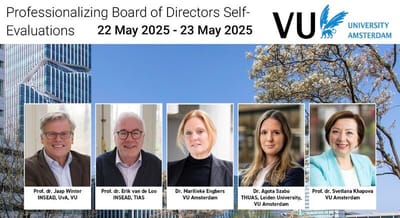
How to Conduct Effective Board of Directors Self-Evaluations
Join us for an exclusive 2-day event: “How to Conduct Effective Board of Directors Self-Evaluations?” Board self-evaluations are becoming a crucial part of effective governance. Yet, there is a lack of clear guidance on how to conduct them successfully. Additionally, a growing number of executive leadership and CEO coaches, as well as team coaches, are entering the field of board coaching, often treating boards as if they function like traditional teams. However, a board is not just a team and cannot be evaluated as one. Unlike conventional teams with clear hierarchies, boards operate within complex power dynamics, implicit norms, and shared, yet sometimes ambiguous, responsibilities. To bring greater professionalization to board reviews and self-evaluations, Vrije Universiteit Amsterdam (VU Amsterdam) is hosting an exclusive two-day event designed for: ✔ Board Members ✔ Board Coaches & Facilitators ✔ Board Secretaries, Advisors & Senior Governance Officers We are bringing together renowned experts and thought leaders from across Europe and beyond to share cutting-edge insights on: 📌 Board dynamics & governance best practices 📌 Evaluation methodologies & meaningful self-assessment approaches Featuring distinguished speakers, including Jaap Winter, Erik van de Loo, Marilieke Engbers, dr. Agota Szabo and Prof. dr. Svetlana Khapova.
Read More
Vakbond in gesprek met Utrecht over angstcultuur bij veegdienst
Utrecht - Employees at the cleaning service of the municipality of Utrecht have little confidence in the approach of the management to improve the unsafe working environment. Research, which RTV Utrecht managed to get its hands on, shows that there is racism and bullying in the department in which managers participate. Today, the trade union FNV will discuss this with the municipality. Marilieke has been asked to reflect on the situation.
Read More
Code Rood: Naar een nieuwe governancecode die inspireert tot reflectie en verandering
Al geruime tijd ben ik (onbetaald) in gesprek met de Maatschappelijke Alliantie over de noodzaak van een nieuwe governancecode die een governancecultuur faciliteert waarin paradoxen worden omarmd en besproken. Dit gesprek heeft geleid tot de oprichting van de alliantie Code Rood, een initiatief dat alles samenbrengt waar ik de afgelopen acht jaar aan heb gewerkt. Ik voel me vereerd en dankbaar dat de Maatschappelijke Alliantie, mij dit podium biedt om dit maatschappelijke en strategische gesprek te entameren. Van mijn promotieonderzoek en aanvullende studies voor de Autoriteit Woningcorporaties en BoZ, tot de circa 100 zelfevaluaties die ik heb begeleid, mijn opdrachten rondom toezicht op toezicht, en het omgaan met stille en open conflicten in de bestuurskamer – het zijn allemaal puzzelstukken in mijn zoektocht naar beter functionerende governance. Ook mijn werk met de controllers van de Controllersopleiding heeft hierin een belangrijke rol gespeeld. Een vraag die mij al die tijd heeft beziggehouden is: Waarom vervallen we steeds in herhalende, niet-productieve patronen met regelmatig debacles als gevolg? Welke aannames liggen ten grondslag aan dit gedrag? En waarom staat in governancecodes wat er staat, wat is er logisch en wat niet? Wat is de rol van de codes überhaupt in deze governancecultuur? Wat is de relatie tussen deze codes en wat er gedoceerd wordt in opleidingen? Ik ontdekte dat experts nieuwkomers informeren over hoe het 'hoort' of 'wat wel en niet werkt' en dat deze suggesties zo vanzelfsprekend zijn geworden, dat de work-arounds en beperkingen nauwelijks nog worden opgemerkt. Nog erger dat als je suggereert dat het anders kan dit eenvoudig leidt tot een defensieve reactie. Tijdens deze subtiele 'leerprocessen' lijkt het besef vaak te ontbreken dat governance ook op een andere manier benaderd kan worden – en in sommige gevallen wellicht zelfs zou moeten. Met Code Rood willen we een nieuwe governancecode creëren die niet dwingend is, maar inspireert. Het doel is niet om verplichtingen op te leggen, maar om de gesprekken in de boardroom en daarbuiten productiever en strategischer maar ook bewuster te maken. De woorden Code en Rood staan symbool voor de toenemende uitdagingen binnen governance: van de multicrisis in de maatschappij tot de groeiende eisen aan toezichthouders, commissarissen en bestuurders. Deze uitdagingen vragen om het continu verzoenen van governanceparadoxen en om diepgaande reflectie – meer dan het simpelweg afvinken van normatieve pas toe of leg uit-principes. Het woord rood verwijst naar het red team-principe. Dit concept, oorspronkelijk uit de militaire wereld, wordt gebruikt om plannen, ideeën en systemen kritisch te toetsen. Een red team werkt onafhankelijk en onderzoekt aannames en blinde vlekken vanuit een ander perspectief. Het doel is niet om te bekritiseren, maar om zwakke punten te identificeren, denkfouten te corrigeren en strategieën te versterken. In het kader van governance streeft Code Rood hetzelfde na: het fungeert als een kritische, maar constructieve tegenstem bij bestaande governancecodes. Waar sommige codes onbedoeld afvinkgedrag of ambiguïteit in de hand werken – problemen waar bestuurders en toezichthouders vaak zelf op wijzen – stimuleert Code Rood reflectie, congruentie en het legitimeren van het agenderen van lastige onderwerpen. Het doel van Code Rood is om te inspireren tot reflectie en actie, een frisse blik te bieden op wat nodig is om governance te versterken, moeilijke gesprekken te legitimeren en ruimte te creëren voor échte verandering. Dit alles in lijn met kernwaarden als inclusiviteit, congruentie, ethiek en duurzaamheid. Waarom dit nodig is, heb ik eerder toegelicht in een ingezonden stuk in het Financieele Dagblad in 2022, bij het verschijnen van de herziene Corporate Governance Code. Met Code Rood willen we samen een stap zetten richting een governancecultuur die daadwerkelijk bijdraagt aan betere besluitvorming en samenwerking. Dit initiatief nodigt uit tot nieuwe gesprekken, andere perspectieven en inspirerende inzichten. Als je meer wilt weten verwijs ik graag naar de website van maatschappelijke alliantie:https://www.maatschappelijkealliantie.org/coderood/
Read More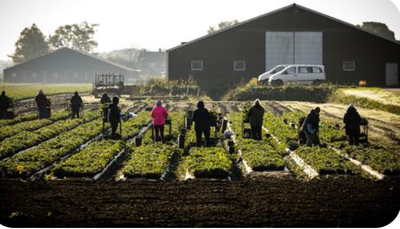
Lezersreactie in het FD over gebrek aan Toekomstgerichtheid van bestuurders
In mijn lezersreactie van vandaag in Het Financieele Dagblad reageer ik op de opinie van Leen Paape en Leo van de Voort van 24 oktober, waarin zij stellen dat bestuurders niet tegelijk ‘op de bal kunnen spelen’ en de toekomst scherp in zicht kunnen houden, en voorstellen om de functies van deze twee rollen te wijzigen. Wat ik vaak zie, is dat bij governance-uitdagingen al snel wordt gegrepen naar structuur- of beleidswijzigingen, terwijl de werkelijke oplossing m.i. eerder ligt in het aangaan van het moeilijke gesprek waarvoor iedereen nu al verantwoordelijkheid draagt. De CEO draagt de verantwoordelijkheid voor het formuleren en uitvoeren van strategie, terwijl de toezichthouder erop toeziet dat de juiste dingen worden gedaan. Andere stakeholders hebben hierin ook een belangrijke rol: zij moeten hen wijzen op hun verantwoordelijkheid. Samen moeten zij hun verantwoordelijkheid nemen door elkaar aan te spreken als de taken niet goed worden uitgevoerd, of in te grijpen wanneer nodig. Een toekomstbestendige governance vraagt dus om een kwalitatief hoogwaardig strategisch gesprek waarin bestuurders, toezichthouders en andere stakeholders hun verantwoordelijkheid nemen en samen reflecteren op de kwaliteit van de uitvoering, de onderlinge machtsverhoudingen en de impact van hun beslissingen. Dit gesprek is persoonlijk, emotioneel en daarom vaak moeilijk. Het is dan ook begrijpelijk dat de neiging bestaat om dit gesprek uit de weg te gaan, maar het hoort nu eenmaal bij de verantwoordelijkheid die samengaat met de rol. Voor wie benieuwd is naar mijn bijdrage in het FD, het is de derde reactie in: 'Genoeg bedrijven waar businessplan alleen werkt door inzet arbeidsmigranten, en andere lezersreacties'
Read More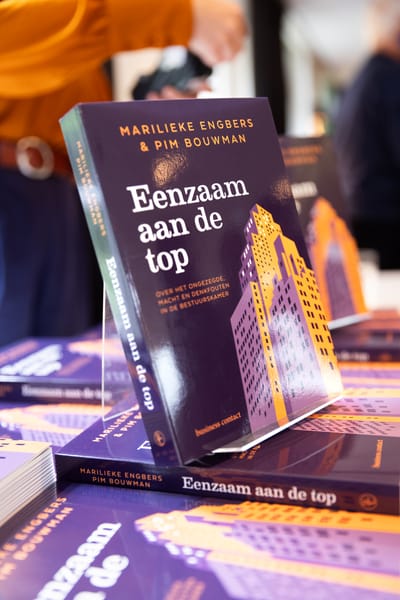
OPROEP! Boekbespreking Eenzaam aan de Top
Good news about our book 'Lonely at the Top'. We are already on the second edition. To celebrate this, we want to organize a series of book reviews in smaller groups of six to eight people. The condition is that the book has been read, or better yet, studied and that you then write a review of what you do or do not recognize, what is relevant about it, what it does to you personally, what you can do with it yourself, or think should be done with it. A review with depth. In a 'post' referring to the book in which you tag us. Depending on the interest, we can do this 'simply' at our home, in the evening, combined with a meal. Is that something? Alternative ideas are also welcome of course! We would love to hear them.
Read More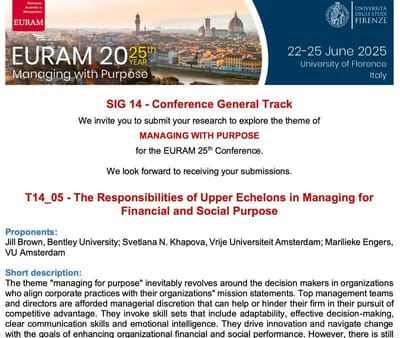
Invitation to submit papers to EURAMn conference!
We invite you to submit your research papers to our EURAM European Academy of Management 2025 track: T14_05 – “The Responsibilities of Upper Echelons in Managing for Financial and Social Purpose.” The conference will be held at the University of Florence, Italy – one of the most inspiring places on earth! This time, I have the pleasure of co-chairing the track alongside my co-proponents, Jill Brown from Bentley University and Svetlana Khapova from Vrije Universiteit Amsterdam (VU Amsterdam). Our goal is to help you develop your papers while also ensuring a fun and engaging experience! The theme “managing for purpose” inevitably revolves around the decision makers in organizations who align corporate practices with their organizations” mission statements. Top management teams and directors are afforded managerial discretion that can help or hinder their firm in their pursuit of competitive advantage. They invoke skill sets that include adaptability, effective decision-making, clear communication skills and emotional intelligence. They drive innovation and navigate change with the goals of enhancing organizational financial and social performance. However, there is still more work to be done in unpacking the black box of strategic leadership that incorporates both financial and social objectives.
Read More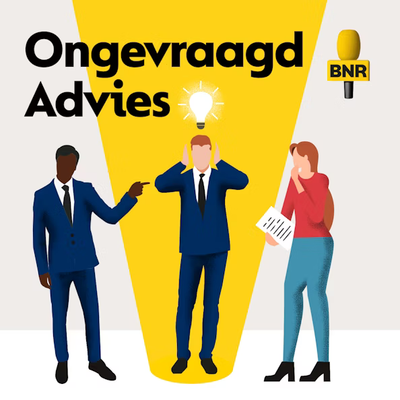
Ongevraagd advies aan commissarissen bij BNR
Bert Huisjes keert voorlopig niet terug bij WNL. Dit heeft Loek Hermans, voorzitter van de raad van toezicht, dinsdagmiddag in een interne e-mail aan de medewerkers meegedeeld. Eerder had de raad van toezicht aangekondigd dat Huisjes, die onderwerp van discussie was na een onderzoek naar grensoverschrijdend gedrag, juist wel zou terugkeren. En dus is het tijd voor ongevraagd advies aan toekomstig commissarissen. En dat komt van Marilieke Engbers, Universitair docent governance & strategie aan de VU en schrijver van het boek 'Eenzaam aan de top'
Read More
FD: Het ongezegde uitspreken in de bestuurskamer zorgt voor betere besluiten
Marilieke Engbers is on a mission. The leadership expert wants to open the black box of the boardroom, to show how blind spots and unspoken thoughts lead to problems. "A lot remains unsaid in meetings, but directors and supervisors are often not aware of that."
Read More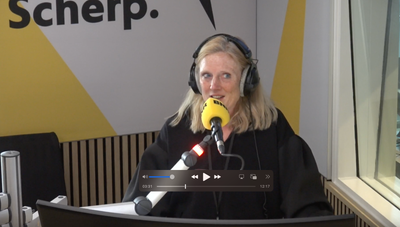
In gesprek bij BNR met Liesbeth Staats en Kees Dorresteijn over ons boek "Eenzaam aan de top"
On May 23, I had the opportunity to talk to BNR about Lonely at the Top. Pim had to laugh when he heard me say 'we are fascinated by therapy'. Maybe not the smartest thing to say if you want to sell your book well. But I did my best :-) If you want to laugh along, it starts after the 43rd minute.
Read More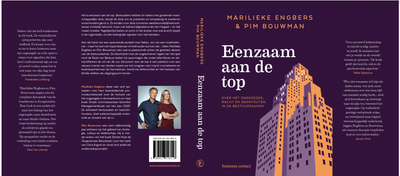
Proefdruk "Eenzaam aan de top gereed" weer een stapje verder
Yesterday Pim Bouwman and I were shown the proof of the outside of our book "Lonely at the top, about the unsaid, power and fallacies" from our Business Contact Publisher. With the 'blurps' of the four people we asked to read the book on the inside flap. We received their response with great anticipation and were fortunate to discover that they had actually extracted the essence that we were trying to convey from the book.
Read More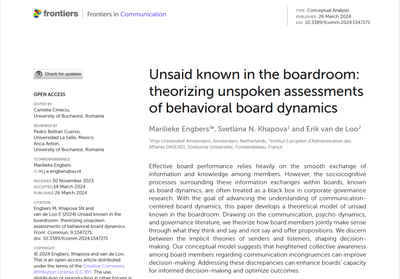
Nieuw artikel gepubliceerd!
I am proud that I have managed to publish a paper again. This is a 'conceptual' paper. Difficult to publish. This is my first paper for my PhD research. Feedback I kept getting is that it is (too) eclectic. I actually think this is very positive feedback because I think that these times require a more multidisciplinary approach. The paper is called: Unsaid known in the boardroom: "Unsaid known in the boardroom: theorizing unspoken assessments of behavioral board dynamics".
Read More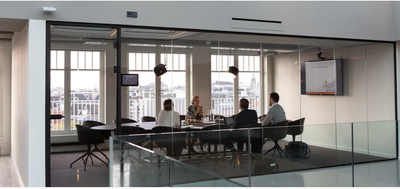
Ongemakkelijke onderwerpen niet op agenda bestuurskamers
Uncomfortable topics often go undiscussed in boardrooms. 'Problems can therefore escalate, with major consequences for the organization and society,' says Marilieke Engbers, journalist and VU researcher in leadership and change.
Read More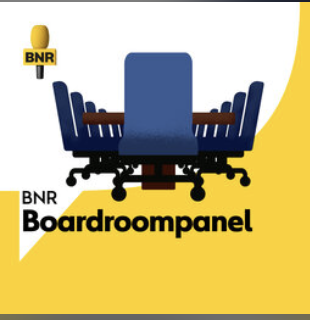
BNR Boardroompanel 14 September 2023
About the episode Experts warn of a manhunt for listed companies now that they have to report on their impact on the climate and the living environment from 2024. Are billion dollar claims lurking? And: Did Rabobank fail to fulfill its duty of care in the bankruptcy of travel company Oad in September 2013? We discuss this and more in the boardroom panel.
Read More
De spelregels van Governance
Directors and supervisors have a lot of power. How is the supervision of this power organised? What is the quality of the opposing force? And how is the transition that is necessary due to climate change, among other things, facilitated or hindered by the governance rules? NCD talked to Marilieke Engbers about untapped potential in the boardroom, the rules and paradigms of governance, young people in the boardroom and major social challenges.
Read More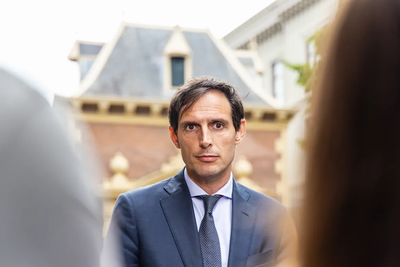
Mistigheid rond voordracht Hoekstra is vooral gemiste kans
Contribution to the Financieele Dagblad on August 28, 2023
Read More
In debat over Tata Steel speelt ook de rol van de toezichthouder
Contribution to the Financieele Dagblad on June 20, 2023
Read More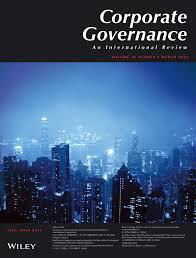
Publication in CGIR: conflict climates
This week I received great, or rather fantastic news that I can't keep to myself! The academic paper that I have been working on for about 4 years will be published in upcoming months in the CGIR Journal!
Read More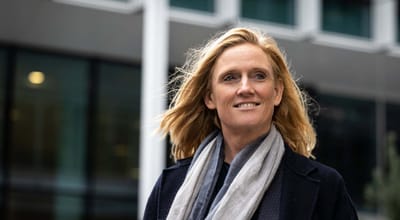
“Als je emoties links laat liggen, ben je alsnog niet in control"
Article in the VRC magazine!
Read More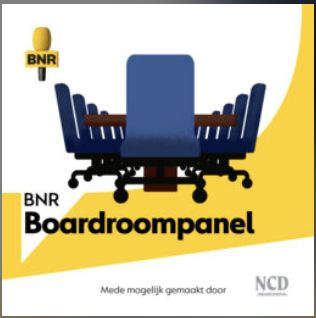
BNR Boardroompanel
This week I had the opportunity to join Thomas van Zijl from BNR again as a boardroom panel member.
Read More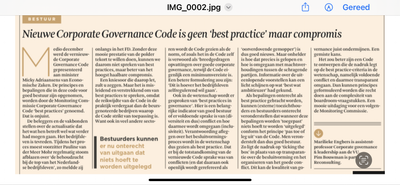
De Nieuwe Corporate Governance Code is teveel een compromis
Our (Pim Bouwman) opinion piece about the updated Corporate Governance Code in Het Financieele Dagblad.
Read More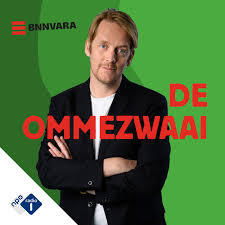
Bijdrage aan podcast de ommezwaai
In een gesprek over macht, tegenmacht en het onvermogen van onze leiders om het voortouw te nemen, komt Sander samen met journalist Jeroen Smit, gedragswetenschapper Reint Jan Renes en assistent professor Management & Organisation Marilieke Engbers tot een verrassend nieuw inzicht.
Read More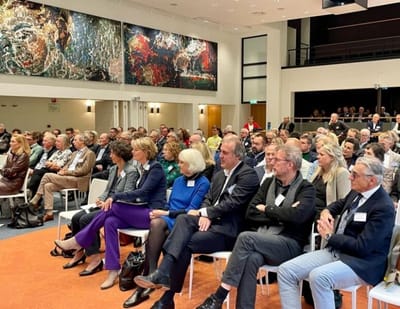
Congresverslag AMG /SER
Executive directors, supervisory directors and members of works councils must 'construct constructively' and work together in the governance triangle, as emerged during the eighth congress of the Alliantie Participation & Governance. About the power of vulnerability, people-oriented thinking and acting, daring to say the unsaid and above all personal leadership: 'Examine your own blind spots and thinking errors.'
Read More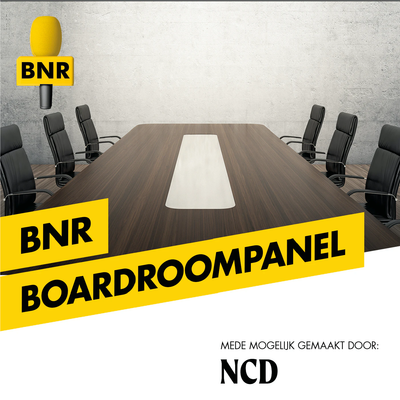
BNR Boardroompanellidmaatschap
Are directors and supervisory directors on the same page about the uncomfortable World Cup in Qatar? We discuss this and more in the boardroom panel of BNR Business Doing. Panel members Presenter Thomas van Zijl will talk to the boardroom panel, which this time consists of: - Marilieke Engbers, assistant professor at the VU, associate partner of consultancy firm ReConsulting and author of the book 'Under supervisory directors' - Roderick Munsters, supervisory director at Unibail- Rodamco-Westfield and PGGM Asset Management
Read More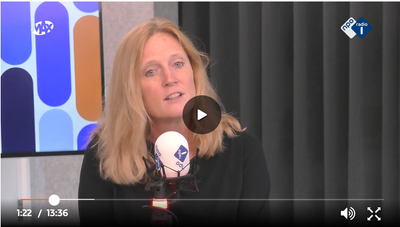
Commissarissen onzichtbaar
Invited at radio 1 Nieuwsweekend to speak about Benschop and Schiphol.
Read More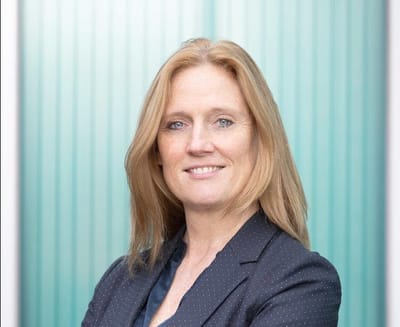
Column in CFO magazine
CFO must take the lead in creating a safe speaking climate
Read More

